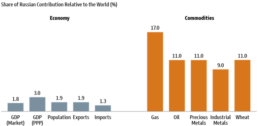CPI inflation rises to 30-year high of 6.2%
CPI inflation recorded an annual rise of 6.2% in February 2022 – the highest since March 1992’s growth of 7.1%.
The World In A Week - Drawing the path for interest rates
Written by Shane Balkham.
Markets remain focused on the war in Ukraine and, although there were tentative signs of progress and positivity over the peace talks in Turkey, the fighting continues unabated. The Ukrainian Government has refused Russia’s demands that the port of Mariupol be surrendered. Development in talks is welcome, however it seems impossible that Europe can return to how things stood before the invasion. Sanctions against Russia will linger and spending on energy security and defence will likely take on greater importance and significance for many countries.
Before Russia had invaded Ukraine and inflicted a terrible toll on human life, the markets were fully focused on the rotation to an interest rising environment and how quickly rates would be hiked in order to combat the rising levels of inflation. Last week, we had the committee meetings from the central banks of the US and UK to give guidance on how they will enact interest rate policy.
The Federal Reserve raised interest rates by 0.25% and gave a generally buoyant outlook, citing the strong employment numbers in the US. This was arguably expected, and the key element was always going to be the forward guidance for the path of rate rises in 2022. The projections from the Fed showed that six additional rate hikes are now priced in for the remainder of the year, putting year end interest rates at 1.75%.
The Bank of England also raised rates by 0.25%, making it three consecutive meetings of rising interest rates by a quarter percent. However, the accompanying rhetoric was more subdued than its US counterpart, noting the risks to the growth stemming from the war in Ukraine.
The war has undoubtedly made the decision making of the central banks more difficult. The effect on the supply of food and energy has increased the pressures on inflation, where prices have already been rising sharply. This could dent consumer confidence and the policymakers will not want to compound the problem by raising rates too quickly, a sentiment that was echoed in the Bank of England’s minutes.
The backdrop continues to be challenging and uncertain and will be for some time. The markets will remain focused on the central banks, even beyond the hopeful cessation of the conflict. Having appropriately diversified investments during times of stress continues to be a successful strategy.
Any opinions stated are honestly held but are not guaranteed and should not be relied upon.
The information contained in this document is not to be regarded as an offer to buy or sell, or the solicitation of any offer to buy or sell, any investments or products.
The content of this document is for information only. It is advisable that you discuss your personal financial circumstances with a financial adviser before undertaking any investments.
All the data contained in the communication is believed to be reliable but may be inaccurate or incomplete. Unless otherwise specified all information is produced as of 21st March 2022.
© 2022 YOU Asset Management. All rights reserved.
Economists: Expect Bank of England to raise rates in Thursday
The further fall in the unemployment rate will spur the Bank of England on to hike interest rates on Thursday, economists predict.
The World In A Week - Commodities & Inflationary conundrum
Written by Richard Warne.
After enduring the COVID-19 pandemic for the last few years and seemingly coming through the other side, I think most would have assumed that the flight path looking forward was going to be a positive one. However, Vladimir Putin’s decision to invade Ukraine certainly has thrown that proposition to the wall. The question is, how long it will last and what will the human cost be. Truly a tragic situation. This has further implications for assessing inflation, growth, and global stability. As geopolitical tensions continue to send shock waves across global markets, many questions about the prospect of stagflation (higher inflation and slowing economic growth) and recession have begun to emerge.
Last week the US banned Russian oil imports, temporarily sending Brent crude oil over $128/barrel before settling down around $110/barrel. US inflation hit a whopping 7.9%, the highest level since 1982, and the Fed signalled a 25bps rate hike at its next meeting, while German CPI touched 5.1%. Last Thursday, the European Central Bank announced that it will scale back its bond-buying stimulus programme faster than previously expected, in response to higher inflation risks. In the US, the 10-year Treasury yield rose 15bps to 1.99%, while the UK 10-year Gilt and German 10-year Bund yields rose 22bps and 25bps to 1.52% and 0.27% respectively, over the week.
On a positive note, many European banks disclosed their direct exposure to Russia with management teams reiterating that exposures are manageable, helping bank stocks and subordinated bonds such as AT1s to recover. Equity markets were generally in negative territory last week, with the MSCI All Country World Index -1.3% in Sterling terms, though we did see a relief rally in the UK with the FTSE All Share up +3.0% and the MSCI Europe ex-UK up+4.1%. We maintain a neutral stance on equities across our portfolios, with all the uncertainty that currently exists. Being tactically overweight, UK equities positively contributed to performance.
Any opinions stated are honestly held but are not guaranteed and should not be relied upon.
The information contained in this document is not to be regarded as an offer to buy or sell, or the solicitation of any offer to buy or sell, any investments or products.
The content of this document is for information only. It is advisable that you discuss your personal financial circumstances with a financial adviser before undertaking any investments.
All the data contained in the communication is believed to be reliable but may be inaccurate or incomplete. Unless otherwise specified all information is produced as of 14th March 2022.
© 2022 YOU Asset Management. All rights reserved.
British GDP growth beats expectations
UK economy bounced back in January 2022 as it grew 0.8 per cent. However, volatility could ‘derail’ economic progress.
Chief Investment Officer Market Update
Written by Shane Balkham.
Many lives have been lost and many words have been written about the terrible war in Ukraine. The conflict has been unpredictable and will continue to wreak havoc on humanity and economies. Uncertainty willcontinue. Russia’s advance is struggling, facing military supply-chain issues, as well as a determined and formidable Ukraine resistance. Sanctions are working and yet it would be foolhardy to predict the outcome of this conflict.
However, whilst the war in Ukraine is quite rightly taking up all the headlines, it is equally important not to be distracted away from other important issues that could affect your investments.
Before Putin made the unfathomable decision to invade its neighbour, the focus for 2022 was the change in monetary environment. For the past two years, the world had deployed a staggering level of economic stimulus to combat the COVID-19 pandemic. It had largely been a success, avoiding the very worst of the doomsday scenarios that were being published in spring 2020. However, the seriousness of the threat from the virus has largely dissipated and the need for emergency conditions no longer exists.
The most significant threat was now inflation, which naturally spiked through an increase in the money supply, as well as increased consumer demand and a constraint on supply. Demand was at high levels due to the boosted level of savings that was accrued during lockdowns and supply was stymied because of the lockdowns. That puts an upward pressure on prices and decade high levels of inflation were the natural outcome.
In order to tackle the high levels of inflation, central banks around the world started to withdraw the accommodative monetary conditions. This is primarily achieved by slowing and stopping its quantitative easing programmes (money printing for the most useful analogy), then starting to increase the level of interest rates. This should soften demand at the same time supply blockages ease.
The most important central bank is the Federal Reserve and throughout 2021 it argued that inflation was transitory and took a more relaxed approach to turning off its stimulus.
However, that ended abruptly in December 2021, when it acknowledged the seriousness of the inflation problem and announced that interest rates would be increasing in 2022.
This was the catalyst for markets to move away from those sectors and stocks that had done well in the pandemic, to those that should do well in an interest rate rising environment. Simplistically, you could say it was a move away from expensive growth and towards those sector and stocks with fairer valuations.
It also started a forecasting leap-frog, with predictions for the number of rate hikes in 2022. Initially forecasts stood at three rate hikes from the Federal Reserve, but quickly rose to an enthusiastic eight. Pressure was mounting the US central bank and it announced that interest rates would be raised at the next meeting in March. All focus was geared around the next six weeks and the expectations for a clear roadmap of forward guidance around rates.
Then Russia invaded Ukraine.
This has generated a smokescreen for the headlines and also created a problem for the Federal Reserve and other central banks around the world. Despite the atrocities being conducted against Ukraine, the inflationary problem still exists and could arguably get worse.
Although Russia’s share of world growth is negligible, its share of commodities is not. The significant role that Russia plays in world commodities may constrain an already tight supply, which would put upward pressure on prices.

Source: Haver Analytics and Goldman Sachs Global Investment Research
Energy prices have already risen sharply, and it will be important to monitor how that affects consumer confidence. As previously mentioned, consumers do have a level of increased savings, accumulated over the pandemic, which could help cushion some of the hit from higher energy prices. There will be pressure on governments to help alleviate the squeeze on incomes, especially as price controls lapse. If energy prices stay this high then it could create a drag on global growth, particularly in Europe where gas prices have risen more significantly than in the US.
Inflation has been forecast to peak around April and May, which will undoubtedly create uncertainty and see volatility spike. It will be natural to extrapolate this data to create worse case scenarios, exacerbated by the war and struggling supply chains. We expect central banks to remain vigilant and continue on the path of raising interest rates, albeit at a more subdued level.
Everything is connected, that was obvious during the lockdowns in the past two years. The war in Ukraine is also connected and we must not forget about the wider implications and that is why we are monitoring the rhetoric coming from the voting members of the Federal Reserve. Next week will be a volatile week, if not for markets, then definitely for news flow and headlines.
The journey of long-term investing will undoubtedly trigger many conflicting emotions and we are here to help guide you through these, to become better investors. Staying invested for the long-term tends to be the best course of action and during times of heightened stress and volatility, there will naturally be the temptation to disinvest, with the intention of reinvesting at a later stage.
We have created an online video presentation to explain the risks associated with long-term investing, which we hope you will find comforting in times of tension and anxiety.
The World In A Week - The Return of History
Written by Cormac Nevin.
As the war in Ukraine entered its second week, the impact of a prolonged conflict began to take its toll on markets. The MSCI All Country World Index of global equities was down -1.3% last week, however the sell-off was intensely concentrated in Europe as the MSCI Europe Ex-UK Index returned -8.9%, while the FTSE All Share Index of UK stocks was down -6.7%. Other markets such as Japanese and US equities were assisted by a weakening GBP and recorded a small positive return. Yet again, these events highlight the critical importance of diversification.
The second and third order effects of the conflict are now becoming evident in international commodity markets and will soon become painfully so to consumers. As of today, oil has surged to roughly $130 per barrel while UK natural gas futures have gone parabolic and have far exceeded the price spike in December of last year. Another troubling dimension is the impact on food and fertiliser prices, given Russia and Ukraine’s global importance in the production and export of both. Wheat futures have surged to an all-time high, and the geopolitical tail risk of food insecurity in the developing world is becoming more pronounced. The Roman poet Juvenal recognised the importance of bread and circuses to maintain civil order, and the emperors would no doubt be surprised to learn that Egypt and North Africa are now major importers of grain from the Eurasian Steppe. The 2011 Arab Spring uprisings were preceded by a spike in the price of food which led to regime change across the region.
These developments likely give more room to run for two of the investment theses which we have had sympathy with over the last two years. One being, that inflation would likely be less transitory than many central bankers might have hoped, and that markets may not be able to rely on monetary support to the same extent in future. Secondly, that there has been a structural underinvestment in the old economy (commodity production & supply chains) and too much capital allocated to flashy tech stocks. As a result, our commodity-focused value equities, inflation-linked bonds, commodities, and absolute return strategies, have been strong performers recently.
Any opinions stated are honestly held but are not guaranteed and should not be relied upon.
The information contained in this document is not to be regarded as an offer to buy or sell, or the solicitation of any offer to buy or sell, any investments or products.
The content of this document is for information only. It is advisable that you discuss your personal financial circumstances with a financial adviser before undertaking any investments.
All the data contained in the communication is believed to be reliable but may be inaccurate or incomplete. Unless otherwise specified all information is produced as of 7th March 2022.
© 2022 YOU Asset Management. All rights reserved.
The World In A Week - Russian Invasion
Written by Millan Chauhan.
Following Russia’s invasion of Ukraine, volatility in markets reached two-year highs which has since seen Russia hit with several sanctions, aimed to restrict its global exports and punish its wealthiest individuals. Western Allies also agreed to block Russia’s access to the Swift international banking payment system. S&P Global has also downgraded Russia’s credit rating to junk status with the sanctions set to reduce the capabilities of their financial markets. Continental Europe is very dependent on Russian Gas, with Germany buying 49% of its gas supply from Russia.
The MOEX (Moscow Exchange) Index closed at -33% on Thursday with the index down -46% year-to-date. Shares in oil and gas stocks sold off sharply with Gazprom closing at -37%. The Russian Rouble also plummeted in value, falling 30% against the US Dollar. The price of Brent Crude Oil briefly surpassed $100 with the sanctions imposed set to distort global supply chains further. This is only expected to increase inflationary pressures and exacerbate the same problem policymakers are trying to address when the Federal Reserve are set to meet next on March 15th.
Global markets sold off sharply last Thursday with Global Emerging Markets & European Markets impacted most, MSCI Emerging Markets declined -3.7% and MSCI Europe ex-UK fell -1.5% in Sterling terms. The S&P 500 closed +2.1% in Sterling terms following significant intra-day trading on Thursday that saw the largest daily swing since March 2020. Volatility remains very high as markets price in new waves of information.
Russia is a very small component of our Global Emerging Markets Equity asset class exposure, but the event itself clearly resonates through global markets. We hope a resolution can be achieved quickly.
Any opinions stated are honestly held but are not guaranteed and should not be relied upon.
The information contained in this document is not to be regarded as an offer to buy or sell, or the solicitation of any offer to buy or sell, any investments or products.
The content of this document is for information only. It is advisable that you discuss your personal financial circumstances with a financial adviser before undertaking any investments.
All the data contained in the communication is believed to be reliable but may be inaccurate or incomplete. Unless otherwise specified all information is produced as of 28th February 2022.
© 2022 YOU Asset Management. All rights reserved.
The World In A Week - Storm before the calm?
Written by Shane Balkham.
The continued threat of a Russian invasion into Ukraine kept markets volatile last week. Tensions were heightened as Russian military exercises, together with their ally Belarus, saw shelling along the border with Ukraine. Inevitably, there were casualties on the Ukraine side of the border.
Fears rose that these exercises were the prelude to a full-scale invasion, as the number of troops amassed on the border reached 190,000. Mediation was given one final chance, with President Macron suggesting to Vladimir Putin, over a telephone call, of holding a Ukraine Summit to discuss security and strategic stability in Europe. This was on the condition that Russia does not invade Ukraine.
The situation does appear to be at an inflection point, one in which diplomacy could still end up being the winner, although there is much at stake and all out conflict is still a valid and likely scenario.
Another battle that is brewing is with the Federal Reserve and its fight with inflation. Promising to raise rates and start its quantitative tightening policy next month, the officials at the US Central Bank have a little over three weeks to set out their forward guidance, in order not to surprise markets.
Traditionally, before the Federal Reserve meets, its officials embark on a series of meetings to deliver the message of what can be expected from future monetary policy. It is an almost cast-iron certainty that rates will be raised by the Federal Reserve, but what is unknown is the pace and path of these future hikes.
Expectations have already violently swung this year, from three hikes in 2022 to six, as well as some Fed officials calling for a half-percent hike in March. Be prepared for plenty of rhetoric as the US Central Bank looks to dampen demand in order to tackle inflation.
Any opinions stated are honestly held but are not guaranteed and should not be relied upon.
The information contained in this document is not to be regarded as an offer to buy or sell, or the solicitation of any offer to buy or sell, any investments or products.
The content of this document is for information only. It is advisable that you discuss your personal financial circumstances with a financial adviser before undertaking any investments.
All the data contained in the communication is believed to be reliable but may be inaccurate or incomplete. Unless otherwise specified all information is produced as of 21st February 2022.
© 2022 YOU Asset Management. All rights reserved.







The World In A Week - Sunak’s Spring Statement
Written by Millan Chauhan.
Last week saw the UK’s Chancellor of the Exchequer, Rishi Sunak, unveil his spring statement update that, in an attempt to support individuals with the rising costs of living, saw a marginal cut in fuel duty and a rise in the minimum threshold of National insurance. On Wednesday last week, UK inflation hit a 30-year high, reaching 6.2% in the 12 months to February. Inflation was at 5.5% in the 12 months to January, but the Russia-Ukraine conflict saw energy prices move even higher due to supply constraints, which has only added to the spiralling increase in living costs. Inflation increased by 0.8% in the month of February, with transport costs being the major contributor. Transport costs have seen an increase of 11.5% in the 12 months to February, the biggest increase of all categories measured by the Office for National Statistics.
Breaking down inflation further, energy prices were a top contributor with the inflation rate of electricity at 19.2% and gas at 28.3% for the year in the 12 months to February. The average household energy bill in February 2022 reached £1,971, compared to the previous year of £1,138, a staggering 73% increase.
Raising interest rates is one of the key monetary policy methods of tackling inflation, with the intention of reducing consumption and promoting savings. Global Central Banks have started increasing rates, with the Federal Reserve raising rates by 0.25% for the first time in 3 years. The Federal Reserve Chair Jerome Powell announced that rate hikes of greater than 0.25% may occur if necessary. The Federal Reserve expect to raise rates at each of their remaining six meetings this year. The pace at which the Federal Reserve acts to raise rates is going to be crucial as they intend to combat inflation fears without crippling the global economy. The current environment remains challenging as central banks are having to control inflation without causing a recession.
Any opinions stated are honestly held but are not guaranteed and should not be relied upon.
The information contained in this document is not to be regarded as an offer to buy or sell, or the solicitation of any offer to buy or sell, any investments or products.
The content of this document is for information only. It is advisable that you discuss your personal financial circumstances with a financial adviser before undertaking any investments.
All the data contained in the communication is believed to be reliable but may be inaccurate or incomplete. Unless otherwise specified all information is produced as of 28th March 2022.
© 2022 YOU Asset Management. All rights reserved.